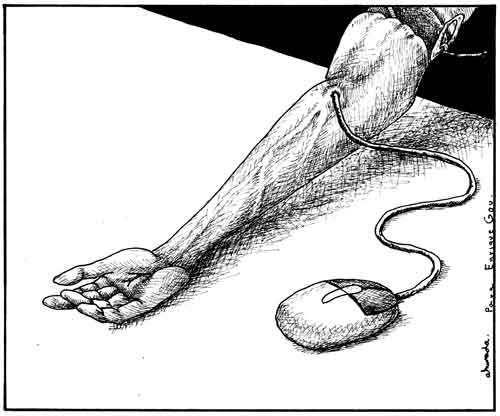Modern Times: The Blackout
Columns, Features, Modern Times - Posted on Tuesday, September 7, 2010 0:20 - 5 Comments
The economist Raj Patel, speaking on the injustices of the global food system, once remarked that soft drinks like Diet Coke are truly symbolic of modern world: whilst some die of starvation, here we have such superabundance that there is a lucrative market for creating food products with zero nutritional value.
The Internet may have found its equivalent in the form of a recently developed piece of software called Freedom. Retailing at a modest ten dollars, Freedom will disable your computer’s internet access for up to eight hours, with no option to unlock save a full system reboot. Our internet access is so ubiquitous, our broadband so fast, cheap, consistent and always on, that we will pay good money for the privilege of being deprived of it.
For me this is more than a hypothetical musing, because this weekend the unthinkable happened: I lost my internet access. Or more precisely, my broadband connection was recalled by a friend in whose name it has always been registered, and the modem transferred from my house to his. I didn’t lose the internet – it was taken from me.
In the grand scheme of things, nothing to lose sleep over. I’d love to say that I felt liberated, intoxicated even; that I began reading an obscure novel, listened to a few jazz vinyls, then wrote this column on my 1950s typewriter. In truth, what I felt was a full, blind panic. A house without an internet connection, surely, is as glaringly incomplete as a house without a fridge, or shower, or cooking hob; it might keep the rain out, but you damn sure couldn’t call it home. How would I read the news, listen to music, catch up on TV? What about my Yahoo!Mail? What about Facebook?
Needless to say, a day later and the world was still turning. My panic slowly ebbed away, replaced with a niggling anxiety. Like a smoker quitting cigarettes I found my mind constantly slipping away to daydream about checking my inbox or Facebook profile, not out of conviction that I was missing anything important but just to relieve the pressure of curiosity that had built up. Not because I thought someone would have sent me a message, but because they might have. It brought to mind the findings of the psychologist B.F. Skinner who, after many years (and many rats) of research into habit and addiction, found that the most powerful way to reinforce a behaviour is by giving rewards intermittently rather than consistently. It’s why gambling can be such a difficult addiction to quit, despite the fact that most gamblers admit they lose more than they win in the long run. And what are we in the age of wifi and smartphones but Skinnerian rats, pawing away at ‘refresh’ in the hope of the solitary hit – the long awaited friend request or touching personal email that gives a big enough payout to keep us sifting through the crap 24/7.
The Freedom programme is like rehab-lite for internet addicts: it begins with surrender to an outside agency, accepting that we have a problem too big to overcome with free choice, and that we’d be better off if someone cut us off from whatever was screwing us up in the first place. Sure enough, the further I get into my involuntary blackout, the more my social networking tics seem to die out – and I’ve just sat down for three hours of solid writing where normally my browser would have swept me away on any number of tangents. The longer I go without internet, I wager, the less I will truly miss it. But that said, my housemate swears he’s going to get us reconnected as soon as he finds out which is the cheapest internet provider.
Shame he can’t just Google it.
Corin Faife is a writer and activist. His ‘Modern Times’ column appears every Tuesday.
5 Comments
Omer
J
Great article. I feel exactly the same when I lose internet even for a day. (Who am I kidding, even for an hour). Anyone got ideas for cutting down on internet time-wasting that don’t involve either spending money on infantilising software or getting rid of it completely? There MUST be a middle path … somewhere.
I am also lost in this tapestry of technology. Great article.
I long to break free.
Alex
Thing is, though I use the internet a great deal, when I am removed from it, as in your scenario or when I go on holiday or even if I have a day away doing other things, I don’t actually miss it much, or feel at all anxious about it as you describe.
The much alluded to ‘middle-path’ is turning your computer off, or your internet connection, and consciously not turning it on. Its actually pretty easy once you get the hang of it! For this very reason, I bought Freedom actually for when I am writing my PhD, I find it to be very useful. Though I, of course, find the name and the philosophical problematic behind it hilarious and troubling.
L
Freedom is a great idea! This might be another reason why
http://www.guardian.co.uk/technology/2010/aug/20/internet-altering-your-mind



nice article! see south park’s ‘over logging’ season 12 episode 6